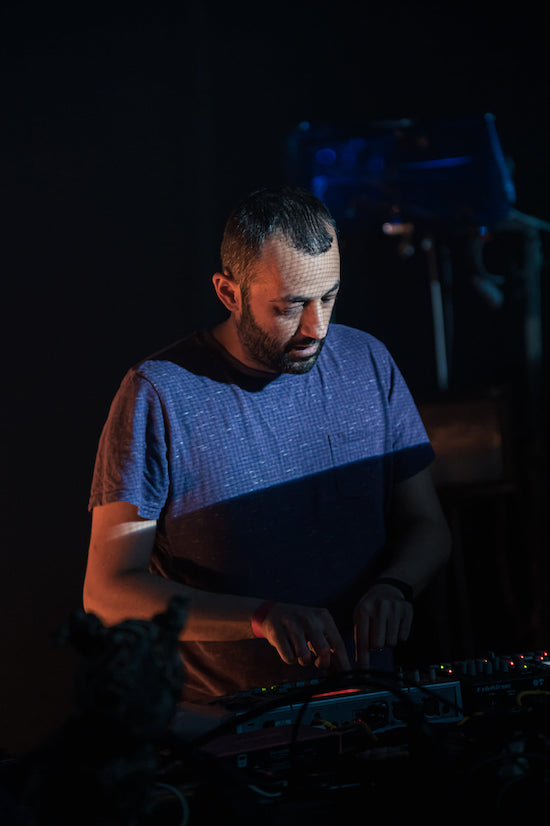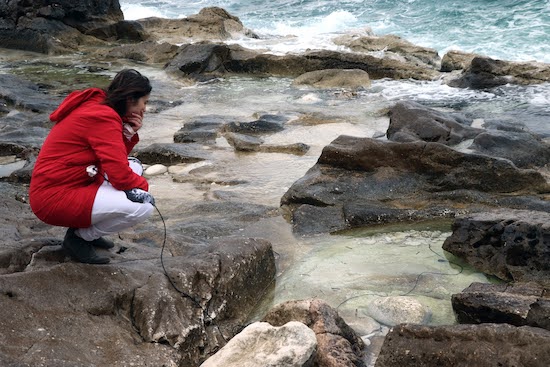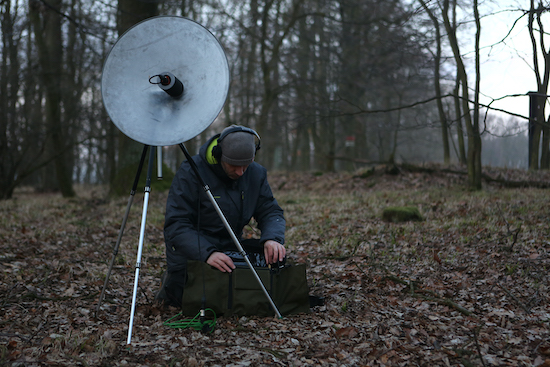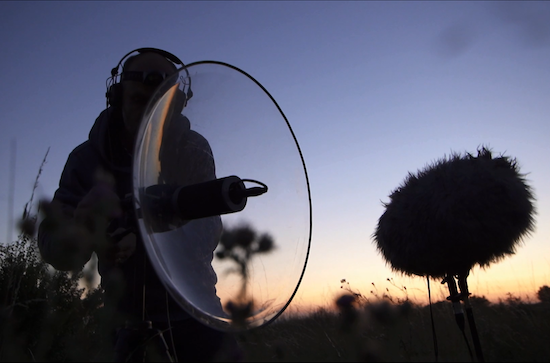Tomáš Šenkyřík portrait by Karel Čtveráček
Have you ever heard of the ghostly-mystical producer HMOT from Russia, or the Polish label Tańce, which merges machine gun rave beats with folklore? Probably not, and it may not necessarily be because they don’t live up to the standard of your favourite New York or London label. A new anonymous community, the Eastbloc Antifascist Sound Alliance, is now trying to draw a musical map of former Eastern bloc countries and connect its diverse and often marginalised producers, while calling out Western publications for being blind to culture from countries such as Poland, Romania and Hungary (as well as having many other forms of systemic bias).
Well, the good news is, it is possible to demonstrate slow "decentralisation" and positive change in some enlightened publications, but the change is distributed differently. The territory often called Eastern Europe is ill-defined and hard to conceptualise on many levels. We want to be taken for what we are, but we are not sure about our identity. This struggle to be recognised which some Eastern Bloc countries are currently going through is happening against the backdrop of the rise of nationalist-populist governments, while many don’t have a vital infrastructure.
At first, this sentiment was simply various discussions taking place on Twitter between people from different former Eastern Bloc countries, voicing similar concerns. "Label owners, musicians, journalists and promoters were describing how hard it is to get coverage and how they are constantly ignored by the UK and US press," members of the anonymous Eastbloc Antifascist Sound Alliance (EASA) explained to me in an interview last October. This group is "a community initiative created around the desire to connect and eclectic and diverse group of people working with sound in Eastern Europe as well as its diasporas, and organise around shared principles." Perhaps their most important encouragement came from experimental musician and activist Antye Greie-Ripatti, known as AGF, who is very active and engaged in advocating for feminist and marginalised communities. This year, she taught The Sonic Wilderness class during the summer semester at the Faculty Of Fine Art in Brno. Lessons with students inspired her to explore the contemporary experimental scene in Czechia more deeply.
She asked herself why this was such a blind spot on the map and met up with people from Prague’s Synth Library, a synth workshop and educational platform, to see if there was an answer. AGF wanted to get other people from different Central and Eastern European countries in touch with each other. They initiated a forum on Discord in March, where people can connect and cooperate.
"The former Eastern Bloc is a mishmash of countries and small communities, which can feel very lonely and isolated sometimes. Maybe we don’t speak the same languages, but we have the same experience of poverty and lack of economic transformation. If you can’t find your peers within your own country, maybe there is someone from a different scene [nearby] that faces similar challenges," an EASA spokesperson adds. It seems like the old geo-political relationship between East and West still has an impact today, even thirty years after the fall of the Iron Curtain. This relationship is still a hot issue and problems of economic disparities, and issues such as cheap labour from the post-communist world and the aftermath of hyperglobalisation are addressed in different academic and journalistic projects like Black Box East by Berliner Gazette and others.

Rami Abadir live at Genot Centre, Prague by Libor Galia
EASA want to clearly state that theirs is not the same struggle as those faced by POC or other marginalised groups. "Nobody is going to look at someone from Hungary or Poland and yell ‘Go back to where you came from’ just based on their appearance, but they might have a loan or application to rent an apartment turned down because of their name. There is still a lot of discrimination in terms of class," they observe. "We believe in intersectionality and that all these fights need to be fought together and continue alongside all the others to create a more equitable music world that reflects our current society." Moreover they are not talking just about Europe but also other Soviet-affiliated countries such as Vietnam, Mozambique, Angola, Afghanistan, and Nicaragua.
On Discord, they are encouraging skill-sharing: mastering records, editing articles and synth repair for example: "We call it an active un-gatekeeping. We are a small initiative, the speck of dust in the scene, but I think some people have found community. You can come to Discord and bitch about whatever. Either you weren’t booked somewhere, or your central heating was turned off."
This year, they released a compilation called Diasporian Dissonances with contributions from AGF, field recording artists Jonáš Gruska and Manja Ristić or Avtomat from Oramics. They are working on a zine and are planning to run a series of debates or workshops. They’ve created The Database Of East Bloc Artists to make it easier, not just for themselves, but for anyone curious to explore music from the region.
They criticise and draw attention to the invisible structures in the industry, some of which are run by large PR machines, and to the potential glass ceilings created by the American and British music media (although EASA fail to acknowledge that many of these titles are facing their own existential problems. The alliance also addresses the lack of visibility of Eastbloc sounds among European festivals, which mostly rely on import rather than local artists. But it is a complex and complicated issue with no easy answers. Obviously, yelling at magazine publisher and editors, music writers, festival curators and so on, on Twitter creates noise in the short term but isn’t a constructive way to find solutions.
EASA members took part in a panel discussion on this topic at Prague’s Lunchmeat Festival in early October, during the Symposium on Digital Arts organised by Prague’s Synth Library team. I left the debate with mixed feelings because the group’s demands sounded too desperate, and vital pieces of the puzzle were missing. The imbalance in coverage is obvious, but at the same time, the music press isn’t public service broadcasting. After the discussion, people were asked to pick up pencils and write some ideas on the dashboard. "Listen to your neighbour, know your fellow raver," said one. Another said: "Learn from each other." And finally: "Activism is not only about criticising but also about highlighting positive examples and stories." That’s precisely the point, I thought. And my research for this essay began.
Another debater in the discussion at the Lunchmeat festival was a Slovak music journalist, occasional tQ writer and curator Lucia Udvardyová who has done great work promoting Eastern European artists. With Peter Gonda, she established an Easterndaze platform in 2010. Udvardyová has been travelling through Eastern European countries and reporting from the front lines. "Although at least geographically, underground music scenes in Central or Eastern Europe are very close to each other, the awareness about each other is often lacking," she said, talking about the motivations behind Easterndaze. In the late 00s, she created a radio show introducing Prague’s sound art scene on London’s Resonance FM and now hosts an Easterndaze show at the politically active Radio Cashmere in Berlin.
In April 2021, she initiated a unique experiment, Community Radio Week, at the Easterndaze x Berlin event she has been curating since 2016. It was hosted by Cashmere Radio, and different community stations such as Radio Kapitał from Poland, Lahmacun Radio from Hungary, and IDA, a joint venture from Tallinn and Helsinki. Hosts featured each other’s shows which rotated on waves of participating radios the whole week. "It was an effort to connect regions that face similar problems and can learn from each other," Lucia explained to me earlier this year for an article in The Wire‘s Radio Activity Issue. During the Community Radio Week you could tune in to raw noise punk from Hungary or listen to the excellent ambient show Sonic Fiction on Radio Kapitał. Besides, people were sharing radio know-how, debating about difficult funding and politics.
I talked with Lucia about this unbalance. "In comparison to ten years ago, I think the situation is slowly improving though, more local writers are contributing to UK music press, writing about their respective scenes from their standpoint," she observed. "If these topics are covered by British or American journalists, they may, for better or worse, sound patronising and slip into exoticisms. They tend to push Eastern European scenes into certain frameworks, such as political and social issues, fashion, brutalism, poverty, general bleakness, in which they want to see them in, rather than portraying them for what they are."
Over time, Lucia contributed to several publications and tried to change the narrative. "From my experience, the editors are open and eager to hear. I had an ongoing column in Electronic Beats magazine for years focusing on Eastern European music, and all the editors were always encouraging. The same goes for the Quietus and The Wire."
I talked to various Eastbloc music writers, and some of them of them mentioned tokenism and box ticking in publications, while some of them raised the same issue of exoticism. They agreed that slow change was occurring. Slovak music journalist Adam Badí Donoval studied in London and contributed to Fact and Bandcamp Daily. After his studies, Donoval returned to Bratislava in Slovakia to run the Warm Winters Ltd. label. He has released a hauntological record from Moscow-based sound artist HMOT (also head of the label Klammklang) or diaristic ambient by Polish artist Martyna Basta.
Donoval admits, though, that he still "feels more obstacles than open doors" and that the situation is harder for labels than music writers. He points also to another structural disadvantage: "There is often not much interest in this kind of underground and experimental music even at home and in the local media. These musicians do not have a strong background from which they could break through…" This would apply similarly for Bratislava, Budapest or Bucharest.
Other regions deal with exoticism too. Rami Abadir, music editor at Ma3azef, feels this strongly as someone from Middle East and he can offer a comparison. Ma3azef aims to cover music from the Arab world and report to Arab readers about what is happening elsewhere in the world. In addition to written journalism, they operate a community radio and have a regular show on NTS. The Ma3azef platform is run by a team of about ten, spread out between Lebanon, Italy, Germany, Britain, Egypt and Tunisia. "Our newsroom is constantly moving," says Abadir, who moved from Cairo to Berlin a few years ago. From here, it is just four hours to Prague where he has friends, and likes to explore local sounds.
"In recent years magazines have given good attention to East or South Africa. For example, I’m speaking about artists affiliated with labels such as Nyege Nyege or Hakuna Kulala, Gqom artists and artists from the Arab region. I can also see artists and labels from East Asia getting sort of coverage, which is great," Abadir observes. "But honestly speaking, I see that part of the drive to cover these regions has to do with exoticism which must be avoided at the end of the day." He prefers an essentialist approach in music criticism, and he would like to see more attention paid to the quality of music than the region where it was made.
"I still remember the first articles about Omar Souleyman, or Mahraganat music (Electro-Chaabi). It was orientalism on steroids, " he recalls. "Exoticism may come in the form of some expectations. It may be unconscious and present despite good intentions," Abadir tells me and gives an example he knows as an electronic musician himself. "Like this non-spoken expectation that us as the Egyptian electronic producers should bring to the western audience. This vibe of One Thousand and One Nights."
Representatives of experimental electronic music from Egypt have broken through to some extent with the success of ZULI’s Terminal (2018), but they struggle with stereotypes in music journalism. Sometimes their music may be thrown into one bag of "non-Western music", where something as different as Japan or Indonesia slips in. According to Abadir’s words, the tone of coverage in music media has improved for the better over the years, and it gave him confidence. "Now I’m working on an album based on oriental beats which I formerly tried to avoid. I like that, and it is my culture, but I would like to be judged only in terms of quality of that stuff."
Further, he compares and looks over the global music map: "Asia, Africa and the Arab world are far away. It has the aura, mysticism, secrets which may be lacking in Eastern Europe, which is kind of close to Great Britain." He means something like: the darkest place is under the candlestick. Eastern Europe is still too close to the centres of power and lacks such distinct identity and mysteries. It is neither exotic enough or Western enough. But at the same time, Abadir finds that even this is changing, and Abadir himself has covered a lot of music from Eastern Europe for Ma3azef. Their broadcast feature shows curated by Czech label Gin&Platonic diving into Eastbloc scenes. And it is fascinating to see how outsider regions subconsciously create such coalitions which establish a stable connection between Eastern Europe and Middle East.
"I consider labels like Genot Centre, Unizone, or Gin & Platonic and artists from Eastbloc region as having the highest potential in the electronic scene. Three years ago, I would be really about the missing coverage of music from Poland, the Czech Republic, Slovakia and other countries." But, now he is optimistic about it: "I see good progress at Inverted Audio, The Quietus, Resident Advisor, Bandcamp Daily, The Wire and DJ Mag compared, for instance, with Pitchfork or Crack magazine." They haven’t done their homework, he tells me.

Manja Ristić portrait by Helena Vilović
Although some of the above mentioned "Western" music media have become more aware of being monocultural and are attempting to open their teams of contributors, "the situation is far from ideal", members of the Eastbloc alliance declare. To test this theory I tried to reach, either through DMs on Twitter or by email, several editors and journalists from the various UK and US music publications which I do not write for in order to avoid bias. Some of them politely refused because of the lack of time or expertise in the subject. Others didn’t reply or even read the message. So, finally I spoke to the editors of English language publications I work with and asked them about their responsibility, editorial policy and journalistic routines.
"I was first brought to The Wire because of my interest in the music of continental Europe and Eastern Europe," remembers Chris Bohn, the magazine’s editor-in-chief, over a Zoom call. In the 1970s, he went to cover ‘Rock In Yugoslavia’ for Melody Maker and a few years after, he travelled to Budapest and Prague to write a famous piece called ‘Trans Europe Express’ for the NME in 1981, an extensive scene report from underground music scenes behind the Iron Curtain. As a half-German person, his interest in Eastbloc culture included learning about his family roots in the Polish town of Milicz. Bohn has been writing for The Wire since the mid-1980s, bringing attention to music from Germany and former Soviet territories. "The Wire had this deep interest from the beginning in musical improvisation scenes from around the world. We’ve always tried to disrupt the traditional hold of the Anglo-American hegemony."
One obvious barrier would be the language. "How important are lyrics?" Chris asks rhetorically. "You’re talking to someone who has been listening to Bob Dylan for fifty years, but I listen to him first and foremost for the voice, the way he sings. I’d argue that musicality of the song is more significant for The Wire than words alone. It’s not always directly about meaning."
"When we have the opportunity, we like to rely on writers based in the parts of the world we want to report on," he explains, "because they are obviously more deeply rooted in those scenes. The trick is how to translate this knowledge to a more international audience. It follows that some writers, who have English as their second or third language, need quite a lot of editing work." Then he concludes with the reflection on music media landscape: "Unfortunately, US and US platforms have too much power in other countries of the world we are writing about. We realise that – and we want to break down this idea."

Tomáš Šenkyřík portrait by Soňa Sommerová
Another editor who answered my emails a few years ago, and started using me as a writer on Czech music was John Doran, co-founder and editor of the Quietus. "When you set up an independent publication with next to no experience, it’s a true DIY endeavour, and all of your education comes on the job, and in public, and in real-time, so it’s inevitable that you will get things wrong," he says looking back to the inception of the site in 2007. A lot of this education came from people he and Luke Turner met along the way. Conversations were had and knowledge transferred. Over the years, there have been occasions where they’ve been called out in public over their editorial decisions. "Sometimes fairly, sometimes unfairly, sometimes in a destructive way, sometimes in a constructive way," Doran comments, "But the most important thing is when they have a point you have to take it onboard."
"This is to the extent that as an editor, your consciousness eventually becomes raised, and you realise that you have to go out and chase this stuff down yourself instead of waiting for it to come to you, no matter how busy you are." A synergy of things happened a decade ago. He went to see the first-ever British show by Omar Souleyman, met people running Sublime Frequencies, started digging into Middle Eastern and North African music. "It came hand in hand with having to educate myself about things like cultural appropriation, post-colonial politics, orientalism and so on," he says.
"A lot of journalism comes from a place of hyperbole or hyperrealism, a wish to reproduce a sense of excitement and being in the moment with new culture; it’s heady but clearly also sometimes a dangerous space to be in if the writer is a Westerner writing about culture, they previously knew little or nothing about. I can only hope we’ve become more clear sighted in regards to these issues over the last decade. The bottom line is we love weird music, and we want to hear weird music from all over the world. And if we can report on this music in a way that isn’t harmful, then all the better."
Afterwards, Doran went on a well-funded trip across Germany with writers from all over the world and met a Polish musician and writer called Filip Kalinowski, who introduced him to the Polish underground. Kalinowski became a writer for the Quietus and the first of many contributors from Eastern Europe. "If we were to wrap up the Quietus today, I’d be quite clear in stating that Stara Rzeka’s Cień chmury nad ukrytym polem would be in the top ten albums we’ve championed in our 13-year history. So really Poland was the key to our ongoing education about the so-called Eastern Bloc countries."
Making connections abroad has been crucial the development of the site’s coverage of music from Eastern Europe but there are still many countries where they are yet to cover. Likewise they are still open to pitches from Western writers but they have to have good contacts in the region, be diasporic or at least be deeply immersed in the culture. "In the beginning we just wrote about everything ourselves because we didn’t know anyone but now it’s better for us to use writers around the world in situ and the onus, to a certain degree, is on us to sort this out. We need to answer emails from Eastbloc writers when we get them." But also, it is a matter of resources. As a genuinely DIY enterprise, the website is constantly short of cash and can’t, for example, afford to send people abroad. They are actively looking to make friends with writers from underrepresented countries who can act as gatekeepers to local underground scenes, helping locate key producers, promoters, bands, venues and labels.
Doran also suggests that some of the fault lies with readers. "Everyone likes the idea of saying they listen to cool music from around the world, but when you’re not talking about a currently hip scene it’s actually very hard, in reality, to get people to click on such articles," he elaborates. "So, yeah, people need to be a bit more open-minded, take more chances with music media and just look at the exercise in an old school, crate-digging kind of way – you’re not going to like everything you hear but occasionally you’re going to stumble across something that is going to blow your mind."
As someone who is also a freelance writer he can also speak from the contributor’s perspective, and he is concerned about how coverage outside of the UK, America, Berlin, select parts of South and East Africa or Jamaica is trend-driven. "I’ve had features rejected by editors of magazines because they say music from X country is of no interest to their readers when editorially, they’re clearly interested in the music (of comparable quality) from Y country… it’s very feast or famine." He keeps on returning to the idea of journalistic and editorial responsibility and concludes: "People like me need to stop assuming that they’re doing enough and to take an actual moral inventory of their working practice. When we do, we’ll realise that there’s still plenty of work to be done."
It means more voices should be heard internationally, and not only just from Eastern Europe. But it is also about local Eastbloc writers covering scenes around them and discovering their surroundings, not simply copying from what they read in the UK and US press and pasting it into articles for local magazines and newspapers. "Even speaking for ourselves, we didn’t know our neighbours," confess members of EASA. "We would love to know what is going in Albania and Macedonia, for example. This ‘colonial mindset’ is always about looking Westwards, and we’re not encouraged to get to know the people around us," they describe the Eastern disorientation and alienation. It is one of the symptoms of extreme westernisation – we haven’t fully become West, but we forget what it is to be Eastern or we haven’t even yet fully understood what it means to be Eastern. We would like to be taken for what we are, but we still don’t know what that means. Should what we do be connected to retro socialist imagery, brutalist buildings, or folk costume? Or should it be something completely different?
A cultural exchange occurs, but not between equal partners because of the incomparable markets and the histories of post-communist countries. Before the Velvet revolution in 1989, there was a more or less efficient information blockade. Everybody was looking to the West because that’s where rock music, disco and reggae was born. The belief that pop music had to be sang in English endured until the late 1970s, but punk changed that; the energy of emancipated underground musicians allowed them to create their own scenes.
After the fall of the Iron Curtain, the so-called Western world was curious to discover the culture from our region and the communist past is the strongest narrative for the Eastbloc to this day. Art was "poor but sexy", as cultural theorist Agata Pyzik observed in her book of the same name. Just to give one example, shoegaze sensation from Prague – Ecstasy Of Saint Theresa – was on the same label and starting line as Cranberries. They played a John Peel Session in 1993. But the interest slowly faded away by the mid-90s.
In his 2012 collection of essays Transition To Nowhere, Boris Buden writes in ‘Recycling The R-waste: (R Is For Revolution)’ how the East was culturally colonised by the West. According to him, the East still suffers a lack of recognition in the 21st Century – after the so-called end of history. It has been seen for too long as merely catching up with the cultural developments it missed during the communist era. Buden suggests calling this process "struggle for recognition – entirely in accordance with the so-called identity politics that dominates political life today". Such cultural processes may be chaotic, and confusing.
At the time of growing far-right regimes and nationalist-populism all over Europe, contemporary underground music scenes from Central and Eastern Europe are undergoing a crisis. EASA say: "We are going through an identity crisis, and we are looking for ways to reflect our identity in the global context without resorting to nationalist values as do our governments. Therefore, we wanted to make the bold statement with ‘antifascist’ in our name. It means we are: anti-racism, anti-homophobia, anti-sexism, anti-capitalism."
I’m writing this while watching videos from Warsaw where people are dancing to beats by Oramics member Avtomat and are protesting against the proposed legislation dubbed "Stop LGBT", after the foundation of so-called LGBT-free zones in some Polish cities, which would ban pride parades and other gatherings in support of sexual minorities. On Polish-Belarusian borders there is a developing humanitarian crisis with people from the Middle East, South Asia, and Northern and Central Africa crossing the external European Union border in the hope of finding refuge; a crisis highlighted by the new Oramics benefit compilation.
EASA believe that people are stronger together and can learn from each other. Moreover, the newly launched alliance points to the ongoing process in the former Eastern Bloc countries of searching for their cultural narrative in the global experimental and independent music scenes. They are trying to find names for their experience, identity, memories and feelings.
In countries like Poland and here in the Czech Republic as well as in Slovakia, we see efforts to reinterpret folklore music by dance music producers within the context of the rave scene. It signals that they have gained courage to be playful with their heritage. Take the Liptov compilation released by Prague label Punctum Tapes for example. Here twelve Slovak and Czech producers confront their partly shared history by reworking folk songs from a 1982 collection into danceable techno, sinister industrial noise or John Carpenter-like-synth wave. An Avtomat, as mentioned earlier, released EP Gusła (Human Rites) on a label called Tańce. Four fierce club tracks are built on the polyrhythms and syncopations from Polish folk dances such as oberek and chodzony. These producers are trying to understand their relationship to the place where they were born.
A lot of artists who utilise field recordings operate in this zone. What they do is not directly connected to folklore, but more to environmentalism and the preservation of landscape through sound. However, still, the place shapes the music of people like Manja Ristić from Serbia, Jonáš Gruska from Slovakia or Tomáš Šenkyřík from the Czech Republic. Their work is closely connected to their immediate surroundings. Ultimately it is about imprinting a sense of place and a sense of identity which is unique, not borrowed or copied, but their own.
"In Europe, we are so close to the dominant Western culture, and we see a lot of cheap copies of that. Artists need to look deep inside themselves and figure out what they want to say, instead of trying to be the Romanian Autechre," say EASA. This symbolises an important awakening, and points towards the future: "We just want to be seen as peers, not an oddity." Diversity is ultimately good for everyone, no matter the place you come from, it means more stories, adventurous sounds and fun after all.




